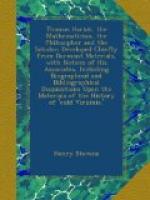Letter 226, from John
Kepler to Thomas Hariot, it
dated from
Prague, September, 1609.
Excuses himself for not having replied sooner; having been very busy; but would not lose the present opportunity of writing. Discusses the questions of refraction and the vacuum. Commentaries on Mars entitled ’Astronomia Nova [Greek Text] or Physica Cælestis,’ have been published at Frankfort; has not a copy by him. Regrets to hear of the death of Gilbert. Hopes his work on Magnetism will also be published; and that Erikson will bring a copy with him. Promises to send a copy of his own meteorological observations; and hopes to receive Hariot’s.
These studies in optics and this correspondence with the learned Kepler indicate Hariot’s great advancement in natural philosophy as early as 1606 to 1609 and give an earnest of his inventive genius and scientific enterprise with his telescope in the astronomical discoveries which immediately followed in 1609 to 1613. Before awarding all the prizes for discoveries and inventions in mathematics, philosophy and natural science to claimants throughout the wide Republic of Letters, let modest Hariot be heard and examined. Let his papers and all his credentials be laid out before the high court of science, not in the light of today, but contemporaneously with those of Tycho, Kepler, Galileo, Snell, Vieta and Descartes. Hariot himself has claimed nothing, but Justice and Historical Truth are bound to assign him a niche appropriate to his merits.
To show that Hariot, like his friends Hakluyt and Purchas, was alive to everything geographical as well as mathematical going on, the following is given from the original manuscript among the Hariot papers in the British Museum (Add. 6789):
Three reasons to prove that
there is a passage from
the North’ west into the
South-sea.
1. The tydes in Port Nelson (where Sr.
Tho : Button did
winter, were constantly, 15, or, 18, foote ;
wc is not found
in any Bay Throughout the world but in such seas
as lie open
att both ends to the mayne Ocean.
2. Every strong Westerne winde did bring
into the Harbor where
he wintered, soe much water, that the Neap-tydes
were equall
to the Spring-tydes, notwtstanding yt the harbor
was open only
to ye E.N.E.
3. In comming out of the harbor, shaping
his course directly
North, about, 60, degrees, he found a stronge
race of a tyde,
set-ting dueEast and West, wc in probabilitie
could be noe
other thing, than the tyde comming from the West,
and
retourning from the East,




